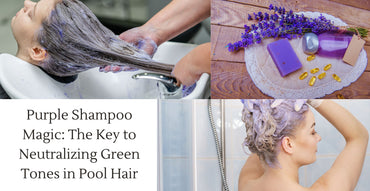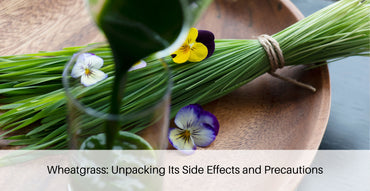In 2024, the realm of skincare has undergone a transformative shift towards vegan skincare essentials, marking a significant milestone in the beauty industry's evolution. With a heightened focus on ethical consumerism and environmental sustainability, cruelty-free has emerged as a predominant choice for individuals seeking to align their beauty routines with their values. From cruelty-free beauty products and formulations to plant-based ingredients, the landscape of vegan skincare in 2024 reflects a growing commitment to compassion, transparency, and holistic well-being. As awareness continues to expand and demand escalates, the vegan skincare movement and plant-based skincare ingredient stands poised to redefine beauty standards and shape a more conscientious future for both individuals and the planet.
The Core Principles of Vegan Skincare
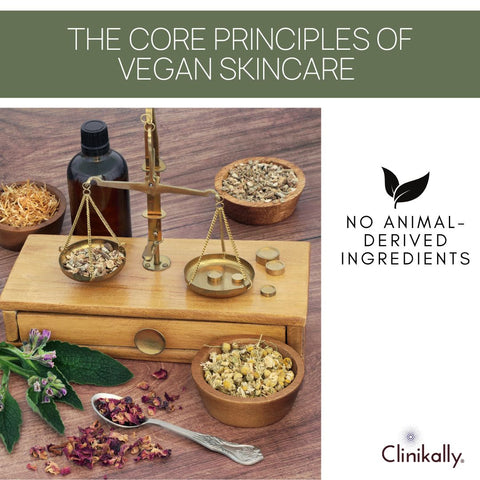
Vegan skincare embraces products formulated without any animal-derived ingredients, focusing on plant-based or synthetic components that do not compromise on effectiveness or luxury. The core principles of vegan skincare intertwine ethics, sustainability, and health, reflecting a commitment to cruelty-free practices and environmental stewardship. Here are some foundational tenets of natural vegan beauty and clean beauty trends:
-
No Animal-Derived Ingredients: Vegan skincare aids in strictly avoiding animal-derived components and ingredients such as honey, beeswax, lanolin, collagen, keratin, and many others that are derived from animals. Instead, it opts for plant-based or synthetic alternatives that provide similar or superior benefits.
-
Cruelty-Free Practices: Beyond excluding animal ingredients, vegan skincare emphasises cruelty-free principles, meaning that the products and their ingredients have not been tested on animals at any stage of product development. This commitment is often verified through certifications from organisations like Leaping Bunny and PETA.
-
Environmental Stewardship: Vegan skincare often aligns with a broader environmental consciousness, prioritising sustainable sourcing of ingredients, eco-friendly packaging, and reducing carbon footprint. The use of plant-based ingredients typically has a lower environmental impact compared to the extraction and processing of animal-derived ingredients.
-
Health and Safety: There's a growing consumer demand for skincare products that are not only effective but also safe and free from harmful chemicals. Vegan skincare products often focus on natural or non-toxic formulations, avoiding harsh chemicals, parabens, sulfates, and synthetic fragrances that can irritate or harm the skin and body.
-
Transparency and Ethics: Transparency in sourcing, manufacturing, and labelling is a key principle in vegan skincare and ethical skincare choices. Brands are expected to be clear about their ingredients, their sources, and their manufacturing processes, ensuring that consumers can make informed choices aligned with their values.
-
Inclusivity: Vegan skincare aims to offer products that cater to a wide range of skin types and concerns, embracing diversity and inclusivity. This means developing formulas that are effective for various skin conditions, complexions, and sensitivities, making vegan skincare accessible to a broad audience.
-
Innovation: The vegan skincare industry is at the forefront of researching and developing innovative ingredients and formulations that do not rely on traditional animal-derived components. This drive for innovation not only enhances the effectiveness of vegan skincare products but also contributes to the discovery of new, sustainable ingredients.
Embracing these principles, vegan skincare offers a compassionate, ethical, and sustainable alternative to traditional skincare, without compromising on quality or performance. As consumer awareness and concern for animals, health, and the environment grow, the demand for vegan skincare continues to rise, encouraging more brands to adopt these core values.
Understanding What Makes Skincare Vegan
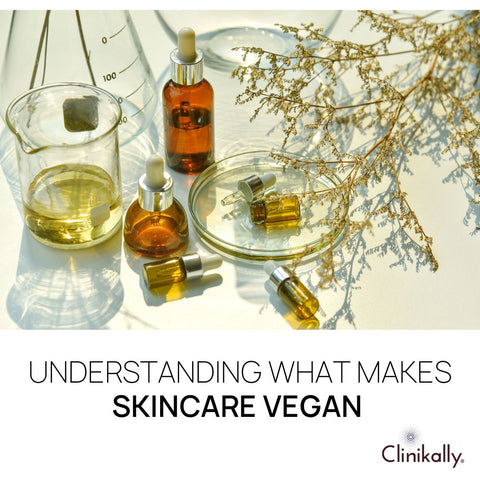
-
Skincare is classified as vegan when it fulfils specific criteria that distinguish it from conventional skincare products. These criteria ensure that the products do not contain animal-derived ingredients, are not tested on animals, and often align with broader ethical and environmental standards. Here's what fundamentally makes skincare vegan:
-
The most straightforward criterion is the exclusion of ingredients that come from animals. This includes, but is not limited to, honey, beeswax, lanolin (from wool), collagen, keratin, squalene (shark liver oil), carmine (red pigment from beetles), and many others. Instead, vegan skincare products use plant-based or synthetic alternatives that can provide similar benefits.
-
While not inherently the same as vegan, cruelty-free practices are closely associated and important to the philosophy behind vegan skincare. Cruelty-free means that the product and its ingredients were not tested on animals at any stage of product development. Many vegan brands also ensure their suppliers adhere to cruelty-free practices. It's important to note that a product can be cruelty-free without being vegan, but vegan products are inherently expected to be cruelty-free.
-
While not a strict requirement for a product to be labeled vegan, many vegan skincare brands prioritize the ethical and sustainable sourcing of their ingredients. This means ensuring that the production of these ingredients does not harm animals, humans, or the environment. Sustainable sourcing also involves minimizing the carbon footprint, using renewable resources, and implementing eco-friendly manufacturing processes.
-
Vegan skincare often emphasizes reduced environmental impact, not just in terms of ingredients but also in packaging and overall brand practices. Biodegradable, recyclable, or reusable packaging options are preferred to minimize waste. By avoiding animal-derived ingredients, vegan skincare also inherently reduces the demand for farming and harvesting resources from animals, which can have significant environmental footprints.
-
Transparency in labelling, sourcing, and manufacturing processes is crucial in vegan skincare. Brands often provide detailed information about the origin of their ingredients and the ethics behind their supply chain to ensure consumers can make informed choices that align with their values.
-
To assist consumers in identifying vegan skincare products, several organisations offer certifications. Look for logos from Leaping Bunny, PETA (People for the Ethical Treatment of Animals), Vegan Action, or Vegan Society. These certifications help verify the claims of the products, providing an additional layer of trust for consumers seeking vegan skincare options.
In summary, what makes skincare vegan extends beyond just the absence of animal-derived ingredients. It embodies a commitment to cruelty-free practices, ethical and sustainable sourcing, environmental stewardship, and transparency, making it a holistic choice for those looking to align their skincare routine with their ethical and environmental values.
Key Plant-Based Ingredients in Vegan Beauty
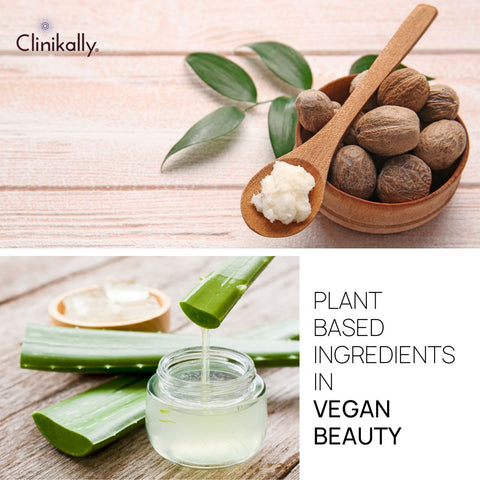
Plant-based ingredients are at the heart of vegan beauty, harnessing the power of nature to nourish, repair, and revitalize the skin. These ingredients are derived from plants and are favored for their efficacy and minimal environmental impact. Here’s a look at some key plant-based ingredients that serve as green beauty alternatives commonly found in vegan beauty products:
-
Aloe Vera: Rich in vitamins, minerals, and amino acids, aloe vera is renowned for its soothing, anti-inflammatory, and hydrating properties. It's excellent for sensitive or irritated skin.
-
Coconut Oil: A versatile ingredient, coconut oil is loaded with fatty acids that are great for moisturising the skin. It also has antimicrobial properties, making it beneficial for combating acne.
-
Argan Oil: Often called 'liquid gold,' argan oil is packed with vitamin E, antioxidants, and essential fatty acids. It’s incredibly hydrating and can help improve skin elasticity and reduce the appearance of fine lines.
-
Shea Butter: Extracted from the nuts of the shea tree, shea butter is a rich emollient known for its moisturising and anti-inflammatory benefits. It’s ideal for dry skin and can also provide mild UV protection.
-
Tea Tree Oil: This essential oil is famed for its antibacterial, antiseptic, and anti-inflammatory properties, making it a powerful ingredient for treating acne and other skin blemishes.
-
Hyaluronic Acid: Although not exclusively plant-based, vegan sources of hyaluronic acid are derived from the fermentation of plants. It's a powerful humectant that can hold up to 1000 times its weight in water, helping to keep the skin plump and hydrated.
-
Jojoba Oil: Closely mimicking the skin’s natural oils, jojoba oil is a lightweight, non-comedogenic moisturiser. It’s effective in balancing oil production, making it beneficial for both dry and oily skin types.
-
Green Tea Extract: Rich in antioxidants, green tea extract can help protect the skin from damage caused by free radicals. It has anti-inflammatory properties as well, which can help reduce redness and irritation.
-
Vitamin C: Found in many fruits and vegetables, vitamin C is a powerful antioxidant that can brighten skin, reduce hyperpigmentation, and stimulate collagen production for firmer, younger-looking skin.
-
Hemp Seed Oil: High in omega fatty acids and vitamins, hemp seed oil is moisturising without clogging pores. It can help to soothe inflammation and protect the skin from oxidative stress.
These ingredients are just a snapshot of the vast array of plant-based options available in vegan beauty products. By harnessing the power of these natural components, vegan beauty products offer effective, eco-friendly alternatives to traditional skincare and cosmetics, promoting health and sustainability.
|
Plant-Based Ingredient |
Main Benefits |
|
Aloe Vera |
Soothes, hydrates, anti-inflammatory |
|
Coconut Oil |
Moisturizes, antimicrobial, nourishes |
|
Argan Oil |
Hydrates, improves elasticity, reduces fine lines |
|
Shea Butter |
Moisturizes, anti-inflammatory, UV protection |
|
Tea Tree Oil |
Antibacterial, antiseptic, anti-inflammatory |
|
Hyaluronic Acid (Vegan) |
Hydrates, plumps skin |
|
Jojoba Oil |
Balances oil production, moisturises |
|
Green Tea Extract |
Antioxidant, reduces redness, anti-inflammatory |
|
Vitamin C |
Brightens, reduces hyperpigmentation, stimulates collagen |
|
Hemp Seed Oil |
Moisturizes, soothes inflammation, antioxidant |
The Ethical Stance Behind Vegan Skincare Choices
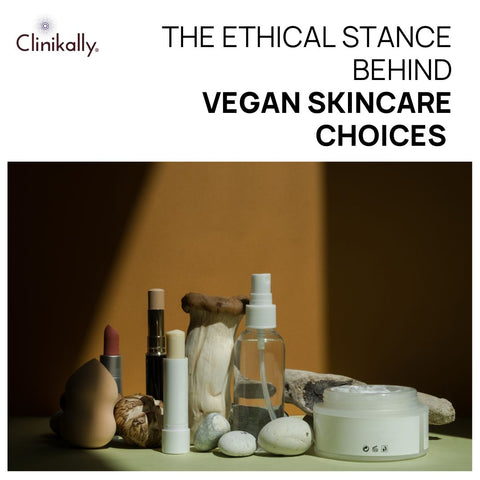
The ethical foundation of vegan skincare choices encompasses several interconnected principles that reflect a commitment to compassion, sustainability, and consumer well-being:
-
Compassion for Animals: Vegan skincare rejects the use of animal-derived ingredients and abstains from animal testing, prioritising cruelty-free practices that honour the dignity and welfare of animals.
-
Sustainability and Environmental Stewardship: By favouring plant-based ingredients, vegan skincare contributes to environmental sustainability. Plant-based ingredients often have a lower environmental impact compared to their animal-derived counterparts, thereby supporting efforts toward biodiversity preservation and ecosystem conservation.
-
Consumer Health and Safety: Vegan skincare prioritises clean formulations, free from harmful chemicals and synthetic additives, to promote skin wellness and minimise the risk of adverse effects.
-
Transparency and Ethical Sourcing: Brands prioritise openness about their ingredient sourcing and manufacturing processes, empowering consumers to make informed choices aligned with their values. By advocating for fair trade practices and supporting ethical labor standards, vegan skincare fosters social responsibility and equitable treatment throughout the supply chain.
In essence, the ethical stance behind vegan skincare choices embodies a holistic approach to beauty—one that embraces compassion, sustainability, and transparency while promoting the well-being of animals, the planet, and consumers alike.
Ingredients to Avoid in Vegan Skincare
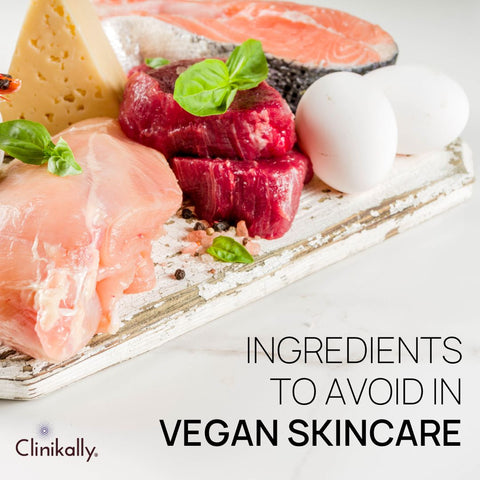
When opting for organic vegan skincare products, it's essential to be mindful of certain ingredients that may still be derived from animals or have adverse effects on the environment. Here are some ingredients commonly avoided in vegan skincare:
- Animal-Derived Ingredients: These include:
- Collagen
- Lanolin
- Beeswax
- Honey
- Keratin
- Squalene (unless plant-derived)
-
Carmine (a red pigment from beetles)
2. Cruelty-Related Ingredients: Ingredients linked to animal cruelty include:
- Guanine (often derived from fish scales)
-
Tallow (rendered animal fat)
3. Non-Vegan Additives: These may not be derived from animals but are not considered vegan due to their production process or environmental impact. They include:
- Shellac (derived from lac bugs)
- Stearic acid (unless plant-derived)
- Glycerin (may be plant-derived or animal-derived)
-
Palm Oil: While not animal-derived, palm oil production contributes to deforestation and habitat destruction, impacting wildlife such as orangutans and tigers
4. Chemical Synthetics: Ingredients such as parabens, sulfates, and phthalates may not be animal-derived, but they can be harmful to the environment and potentially irritating to the skin. Opting for natural or plant-based alternatives is often preferred in vegan skincare.
5. Microplastics: These are small plastic particles often found in exfoliating scrubs and some cosmetics. Not only are they harmful to marine life when washed down the drain, but they also contribute to plastic pollution.
6. Silk Proteins: Silk is derived from silkworms, making it non-vegan. Some skincare products contain silk proteins for their purported benefits, but these can be avoided in vegan skincare.
7. Lactic Acid: While it can be plant-derived (from sources like fermented vegetables), lactic acid can also be derived from milk. Opt for products explicitly labelled as plant-derived or vegan-friendly.
By being aware of these ingredients and checking product labels carefully, individuals can ensure they are making truly vegan and cruelty-free skincare choices that align with their values.
Common Animal-Derived Components in Beauty Products
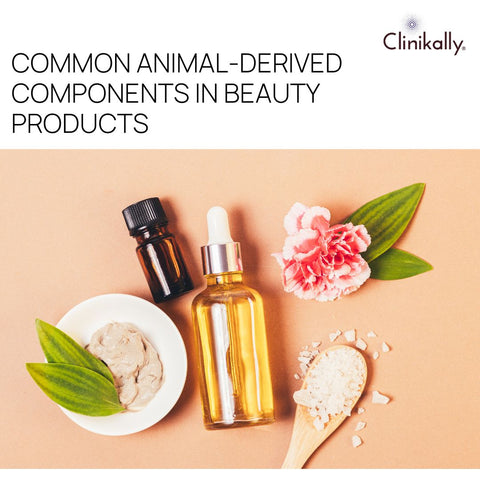
Animal-derived components are prevalent in many beauty products, including skincare, cosmetics, and hair care items. These components are derived from animals and may be used for various purposes, such as enhancing texture, providing moisture, or imparting specific properties. Here are some common animal-derived components found in beauty products:
-
Collagen: Derived from animal connective tissues, collagen is often used in anti-aging skincare products to improve skin elasticity and firmness.
-
Beeswax: A natural wax produced by honeybees, beeswax is commonly used in lip balms, moisturizers, and hair products for its emollient and protective properties.
-
Honey: A natural sweetener produced by bees, honey is used in skincare products for its moisturizing, antibacterial, and antioxidant properties.
-
Lanolin: Derived from sheep's wool, lanolin is a rich emollient commonly used in lip balms, creams, and lotions to moisturize and soothe dry skin.
-
Carmine (Cochineal): A red pigment derived from crushed cochineal insects, carmine is used as a colorant in lipsticks, blushes, and other cosmetics.
-
Guanine: Derived from fish scales, guanine is used in cosmetics to create shimmer and sparkle effects in products like eyeshadows, nail polishes, and highlighters.
-
Keratin: A protein found in animal hair, feathers, and horns, keratin is used in hair care products to strengthen and condition hair.
-
Squalene: Traditionally sourced from shark liver oil, squalene is used in skincare products for its moisturizing and antioxidant properties. However, vegan-friendly alternatives derived from plant sources like olives are now available.
-
Shellac: Derived from the lac beetle, shellac is used as a resinous coating in nail polishes and hair styling products for its glossy finish and protective properties.
-
Silk Proteins: Derived from silkworms, silk proteins are used in skincare and hair care products for their moisturizing and conditioning properties.
-
Glycerin: While glycerin can be plant-derived (from sources like coconut oil or soybean oil), it can also be derived from animal fats. It is used as a humectant in skincare products to attract moisture to the skin.
-
Tallow: Rendered animal fat, often sourced from cows or sheep, tallow is used in soaps, moisturizers, and lip balms for its emollient properties.
-
Elasatin: Derived from animal elastin, elasatin is used in skincare products for its purported skin-tightening and firming effects.
-
Ambergris: A waxy substance derived from the digestive system of sperm whales, ambergris is used in perfumes and fragrances as a fixative to prolong scent.
-
Guanine (Fish Scales): As mentioned earlier, guanine, derived from fish scales, is used in cosmetics to create shimmer and sparkle effects.
-
Stearic Acid: While stearic acid can be derived from plant sources like cocoa butter or shea butter, it can also be derived from animal fats. It is used as an emulsifier and thickening agent in skincare products.
-
Elastin: Derived from animal connective tissues, elastin is used in skincare products for its purported anti-aging properties, promoting elasticity and suppleness in the skin.
-
Retinol (Vitamin A): While retinol itself is not derived from animals, it is often synthesized from animal-derived sources like liver oil. Retinol is used in skincare products for its anti-aging and skin-renewing properties.
-
Cetyl Alcohol: Cetyl alcohol can be derived from animal fats or petroleum sources. It is used as an emollient and thickening agent in skincare products.
-
Keratin: As mentioned earlier, keratin is a protein found in animal hair, feathers, and horns, and is used in hair care products for its strengthening and conditioning properties.
These animal-derived components may not be suitable for individuals following a vegan lifestyle or those concerned about animal welfare. Fortunately, there are many vegan-friendly alternatives available in the beauty market that provide similar benefits without the use of animal-derived ingredients.
Navigating the Labels: Identifying Non-Vegan Ingredients
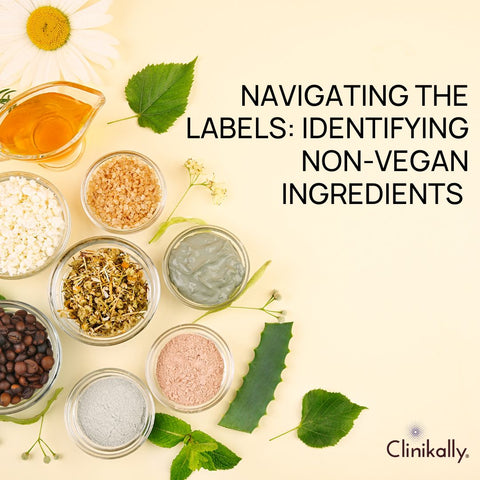
Identifying non-vegan products in skincare requires careful scrutiny of ingredient lists, as well as consideration of labelling and certification. Here are some tips to help you identify non-vegan skincare products:
-
Check Ingredient Lists: Look for common animal-derived ingredients such as collagen, beeswax, lanolin, honey, keratin, squalene (unless plant-derived), carmine, guanine, and silk proteins. Avoid products containing these ingredients if you're seeking vegan options.
-
Look for Certifications: Seek out certifications from reputable organizations such as Vegan Society, PETA's Beauty Without Bunnies, or the Leaping Bunny program. These certifications indicate that the product has been verified to be free from animal-derived ingredients and not tested on animals.
-
Avoid Products Labeled as "Animal-Derived" or "Animal-Based": Some products may explicitly state that they contain animal-derived ingredients. Avoid products with such labeling if you're looking for vegan options.
-
Be Mindful of Non-Vegan Additives: Some additives, while not derived directly from animals, may still be considered non-vegan due to their production process or environmental impact. Examples include shellac, stearic acid (unless plant-derived), glycerin (unless plant-derived), and retinol (unless plant-derived or synthetically produced).
-
Research Brands and Companies: Familiarize yourself with brands and their values. Many vegan skincare brands proudly advertise their cruelty-free and vegan status on their websites and packaging. Conducting research can help you identify trustworthy brands that align with your values.
-
Read Reviews and Seek Recommendations: Online reviews and recommendations from vegan beauty bloggers or communities can provide insights into which products are truly vegan-friendly and effective.
-
Contact the Manufacturer: If you're unsure about a product's vegan status, don't hesitate to reach out to the manufacturer directly. They should be able to provide clarification regarding the sourcing and origin of ingredients.
By following these guidelines and remaining vigilant when purchasing skincare products, you can effectively identify non-vegan options and make informed choices that align with your ethical and lifestyle preferences.
Alternative Vegan Ingredients for Optimal Skincare

Vegan skincare relies on a variety of plant-based and synthetic ingredients that offer comparable benefits to their animal-derived counterparts. Here are some alternative vegan ingredients commonly used in skincare for optimal results:
|
Animal-Derived Ingredient |
Vegan Alternative |
|
Collagen |
Plant-based peptides, algae extract |
|
Beeswax |
Candelilla wax, soy wax, carnauba wax |
|
Lanolin |
Vegetable-derived emollients like shea butter or cocoa butter |
|
Honey |
Agave nectar, maple syrup, or plant-derived humectants |
|
Keratin |
Plant proteins like wheat protein or soy protein |
|
Squalene |
Squalane derived from olives, sugarcane, or amaranth seeds |
|
Carmine |
Plant-based colourants like beetroot extract, alkanet root, or synthetic dyes |
|
Guanine |
Mica, synthetic pearlescent pigments |
|
Tallow |
Vegetable oils like coconut oil, palm oil, or sunflower oil |
|
Elastin |
Vegan elastin alternatives derived from plant proteins or peptides |
|
Ambergris |
Plant-based fragrances or synthetic fixatives |
|
Glycerin |
Plant-based glycerin derived from vegetable oils |
|
Shellac |
Plant-based resins like gum arabic or cellulose derivatives |
|
Stearic Acid |
Plant-based stearic acid derived from cocoa butter or shea butter |
|
Elastin |
Plant-based proteins like soy or pea protein |
|
Retinol |
Plant-derived retinol alternatives like retinyl palmitate or bakuchiol |
|
Cetyl Alcohol |
Plant-based emollients like cetyl esters or cetyl alcohol derived from coconut |
|
Silk Proteins |
Plant-based proteins like soy or wheat protein |
|
Lactic Acid |
Plant-based lactic acid derived from fermented sugars or botanical sources |
By opting for vegan alternatives, consumers can enjoy skincare products that are cruelty-free, sustainable, and effective, while still achieving the desired benefits for their skin.
Embracing Vegan Skincare for a Sustainable Future

Embracing vegan skincare for a sustainable future involves adopting practices and making choices that prioritize environmental stewardship, animal welfare, and personal well-being. Here's how individuals can incorporate vegan skincare into their routine for a more sustainable future:
-
Choose Vegan-Certified Products: Look for skincare products certified by reputable organisations like Vegan Society, PETA's Beauty Without Bunnies, or the Leaping Bunny program. These certifications ensure that the products are free from animal-derived ingredients and have not been tested on animals.
-
Read Ingredient Labels: Be diligent about reading ingredient labels and avoiding products that contain animal-derived ingredients such as collagen, beeswax, lanolin, and carmine. Opt instead for products made with plant-based and synthetic alternatives.
-
Support Ethical and Sustainable Brands: Research and support skincare brands that prioritise ethical sourcing, sustainability, and transparency in their practices. Look for brands that use eco-friendly packaging, ethically source ingredients, and minimise their environmental footprint.
-
Reduce Waste: Choose skincare products with minimal packaging or opt for brands that use recyclable or biodegradable packaging. Consider purchasing products in bulk or using refillable containers to reduce packaging waste.
-
DIY Skincare: Experiment with making your own skincare products using natural, plant-based ingredients. DIY skincare allows you to control the ingredients used and minimise the environmental impact of packaging and transportation.
-
Conserve Water: Practise water-saving techniques when cleansing and moisturising your skin. Use lukewarm water instead of hot water, and avoid leaving the tap running while washing your face or applying skincare products.
-
Educate Others: Share your knowledge and enthusiasm for vegan skincare with friends, family, and social media followers. By raising awareness about the benefits of vegan skincare for the environment, animals, and personal health, you can inspire others to make more sustainable choices.
-
Advocate for Change: Support policies and initiatives that promote cruelty-free practices and transparency in the beauty industry. Advocate for stricter regulations on animal testing and the use of animal-derived ingredients in skincare products.
By embracing vegan skincare practices, individuals can contribute to a more sustainable future by reducing their environmental impact, supporting ethical and transparent brands, and promoting compassion for animals.
Benefits of Switching to Vegan Skincare Routines

Switching to vegan skincare routines offers several advantages for both individuals and the environment:
-
Cruelty-Free: Vegan skincare products are not tested on animals, promoting ethical treatment and welfare of animals.
-
Environmentally Friendly: Plant-based ingredients used in vegan skincare have a lower environmental footprint compared to animal-derived ingredients, reducing habitat destruction and greenhouse gas emissions.
-
Healthier Skin: Many vegan skincare products contain natural ingredients rich in vitamins, antioxidants, and essential fatty acids, promoting healthier and more radiant skin.
-
Non-Toxic Formulations: Vegan skincare products are often free from harsh chemicals, parabens, sulphates, and synthetic fragrances, reducing the risk of skin irritation and allergic reactions.
-
Gentler on Skin: Plant-based ingredients are typically gentler on the skin, making vegan skincare suitable for individuals with sensitive or allergy-prone skin.
-
Eco-Friendly Packaging: Many vegan skincare brands prioritise sustainable and recyclable packaging, reducing plastic waste and environmental impact.
-
Supports Sustainable Practices: By choosing vegan skincare, individuals support sustainable practices such as ethical ingredient sourcing, fair labour practices, and eco-conscious manufacturing processes.
-
Alignment with Values: For those who value compassion, sustainability, and environmental stewardship, switching to vegan skincare aligns with their ethical beliefs and lifestyle choices.
Overall, transitioning to a vegan skincare routine offers numerous benefits for personal health, animal welfare, and the planet, making it a sustainable and conscientious choice for skincare enthusiasts.
Leading Vegan Skincare Brands and Products

We, at Clinikally, are doing our bit to make vegan and cruelty-free brands of skincare accessible with just a click. Here’s a list of few of the leading brands that promise being vegan and cruelty free.
-
AMA Herbal Laboratories
-
Awear Beauty
-
Coola LLC
-
Klairs
-
D'Vacos Cosmetics & Neutraceuticals
-
Kativa
-
Novology
-
Numis Med
-
Soteri Skin
-
Yuderma
The Impact of Vegan Choices on Skin and Environment
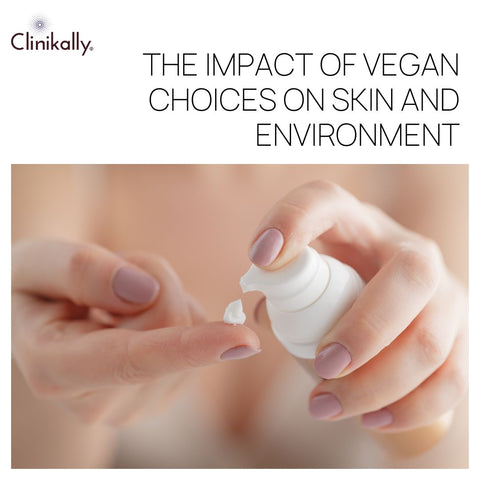
The impact of vegan choices on both skin and the environment is significant and multifaceted:
-
Impact on Skin:
-
Healthier Skin: Vegan skincare products often contain natural ingredients rich in vitamins, antioxidants, and essential fatty acids, which can promote healthier, more radiant skin.
-
Reduced Sensitivity: Plant-based ingredients tend to be gentler on the skin, making vegan skincare suitable for individuals with sensitive or allergy-prone skin.
-
Non-Toxic Formulations: Vegan skincare products are typically free from harsh chemicals, parabens, sulfates, and synthetic fragrances, reducing the risk of skin irritation and allergic reactions.
-
Moisture Retention: Plant-based ingredients like hyaluronic acid and plant oils can effectively moisturize the skin, improving hydration levels and combating dryness.
2. Impact on Environment:
- Reduced Carbon Footprint: Vegan skincare products often use plant-based ingredients that have a lower environmental footprint compared to animal-derived ingredients, reducing greenhouse gas emissions and resource consumption.
- Preservation of Habitats: By avoiding animal-derived ingredients, vegan skincare helps reduce the demand for habitat-destructive practices such as deforestation and intensive farming.
- Minimized Pollution: Vegan skincare brands often prioritize eco-friendly packaging and manufacturing processes, minimizing pollution and waste generation.
- Conservation of Biodiversity: Choosing vegan skincare supports sustainable practices such as ethical ingredient sourcing, which helps preserve biodiversity and protect endangered species.
In summary, vegan choices in skincare can lead to healthier skin and have positive environmental implications by reducing resource consumption, minimising pollution, and supporting sustainable practices. By opting for vegan skincare products, individuals can contribute to a more sustainable and compassionate future for both themselves and the planet.
The Evolution of Skincare: Moving Towards a Vegan Future

The evolution of skincare is steadily moving towards a vegan future, driven by a growing awareness of the interconnectedness between personal health, environmental sustainability, and animal welfare. As consumers increasingly prioritise ethical, eco-conscious and compassionate skincare choices, the demand for vegan skincare products continues to rise. This shift represents a pivotal moment in the beauty industry, where compassion, transparency, and sustainability converge to redefine beauty standards and pave the way for a more conscientious and compassionate future.





